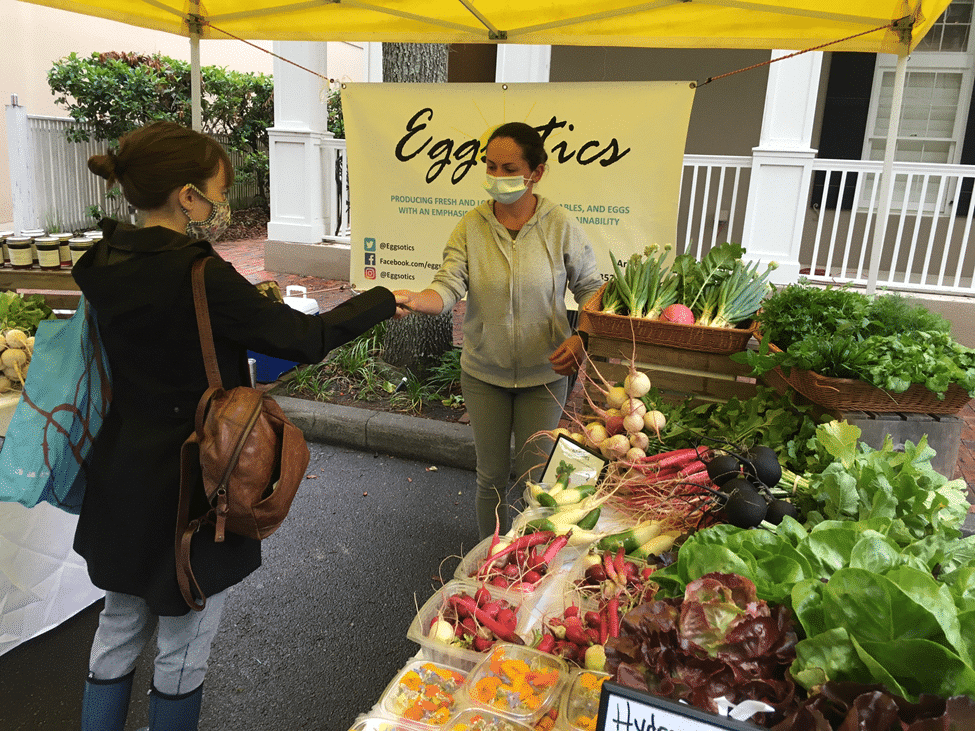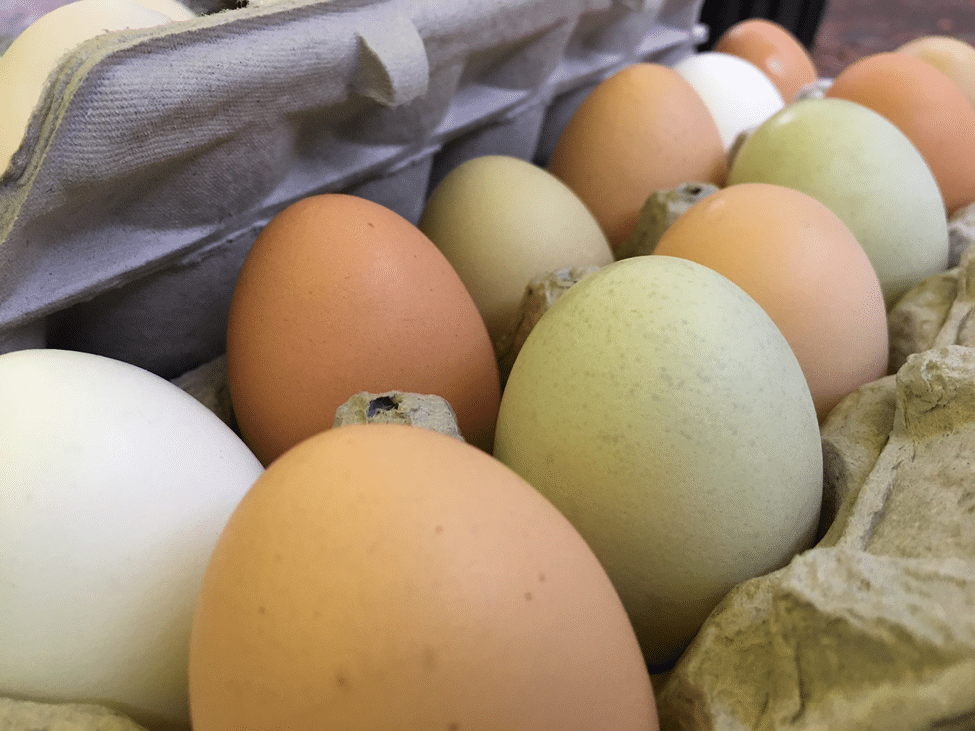Important Questions to Ask at the Farmers Market
and those maybe not to worry about?
Are you ever unsure about what important questions to ask at the Farmers Market?
My wife Natalia is a farmer. Every Friday night I gaze into the dark field behind our house, and I can see her flashlight beam scanning the darkness. In the waning hours of her sixteen-hour day, she harvests last-minute crops to be sold at morning light at the peak of freshness. Soon we’ll wake up at the crack of way-too-early to load heavy boxes into the bed of our pickup truck, transporting her harvest to a local farmers market.
During the week while she’s toiling in the field, I sit at an air-conditioned desk. I’m a professor of horticulture, working mostly in the genetics of fruits. For years I worked closely with fruit and vegetable industries in the State of Florida, so I understand a lot about how crops are grown and what real issues are around food and farming. Joining my wife at the farmers market is a great way to help her sell her crop and at the same time extend a little professorial expertise into my community.
I adore the customers at the market. They are discerning. They care about quality, freshness and flavors. They ask questions and share their experiences. They shop at farmers markets because knowing the producer is important to them. They want to support local farmers and keep their dollars in their community. They trust market products. Their investment comes home as the freshest, highest quality produce, usually hours off the plant, with an almost non-existent carbon footprint.
While Natalia smiles and shines behind the counter, I stand in front of the booth and highlight her offerings and answer customer questions. Over the last several years I have heard it all, from solid thought-provoking questions to far-out wacky concerns.

I wanted to share some of the best questions and some that are not so helpful. Hopefully they can help you be a better shopper when you choose to support local agriculture.
The most important questions to ask.
Did you grow this on your farm? A substantial number of farmers markets are plagued by peddlers. Peddlers are not farmers, but middlemen, people that purchase cheap, sometimes reject produce from wholesalers, farmers, or off the back of some truck. They re-sell it at a farmers market as “local” produce. Since they simply re-sell mass produced fruits, vegetables and eggs they can afford to let it go at lower costs and severely undercut actual local producers.
Watch for vendors that pull produce from commercial boxes or sell crops that are clearly out of season. A vendor I saw had perfect cucumbers in the middle of winter, covered with a commercial waxy layer, yet claimed to grow them on his farm, when they were clearly from a commercial operation.
Many markets explicitly forbid reselling produce, and perform rigorous, regular farm inspections to verify that produce is grown on site. Stick to those markets, or at least purchase from credible vendors that grow the crop themselves.
Where is your farm located?
Farmers markets are engines that provide food to their community, but are they really local? The answer lies only in the perception of the consumer. Remember, many farmers travel great distances to participate in good markets, so consider their “local” location against a farm’s ethics, sustainability commitment and product quality.
Do you allow visitors to the farm?
Most small farmers are thrilled to show off their operations and welcome planned visits and tours. It is about the customer relationship, about transparency, and the dual role of farmer and educator. However, many animal agriculture operations are skeptical of intentions, as animal rights groups have produced harmful negative videos based on staged events, so don’t be surprised if they only will handle small groups or request that some areas are off limits. If any vendor outright rejects visitors, there might be something they are hiding.
When was this harvested?
One of the reasons you want to buy locally is to enjoy fresh produce, with all of its vitamins, minerals and active enzymes. Truly local produce is usually harvested hours or days before it arrives at the market.
Who performs the labor on your farm?
You can learn a lot about a farm’s ethics by how they recruit and retain assistance. Farming can be laborious and tedious, and farms employ a wide span of labor, from seasonal pickers, to students, to permanent employees with benefits. Some rely on volunteers or offer opportunities through apprentice programs. Others are loners that plant it, grow it and sell it by themselves. Producers should be willing to discuss how the work is done, and you likely will be very impressed.
What are your crop protection strategies?
A lot of vendors post signs proclaiming “We Don’t Spray.” Does that mean they don’t use insecticides or methods to protect crops from insects and microbial infection? Not necessarily. When farmers talk about “crop protection strategies” they mean the ways they control insects, weeds, fungus, bacteria and viruses. It is almost impossible to not deal with pests and pathogens, so just about every farm uses some sort of approach. They may not spray, but they might sprinkle chemicals, employ biologicals (bacteria or insects that compete with pathogens), or demand back-breaking labor in hand cultivation. It is important to know what strategies they employ.
Do you and your family eat what you don’t sell?
We get asked this a lot! Usually it is fishing for a recipe or other novel use, but it could also be a good test to ensure food safety. I’d eat anything we sell right off the market table. Still, you should always wash any produce before eating it.
Where can I follow you in social media?
Many small farms use Facebook, Twitter and Instagram to provide an inside look at day-to-day operations. You can learn a lot about their practices and products, and at the same time communicate what you’d like to see at the market. Many small farms are happy to oblige. Shares, likes and retweets are always appreciated!
Not the most important questions to ask.
Do you give your chickens hormones or antibiotics? No hormones are ever used in poultry – for meat or for eggs. While commercial packages may say “hormone free” that is true of every bird or egg you can purchase, labeled or not. Antibiotics? As small producers we daily inspect the flock and if there is a sign of a health problem or infection (sometimes they get a foot problem from stepping on something pointy) we absolutely will use the appropriate medication and that might include antibiotics. Wounds are cleaned, and topical antibiotic salves are applied. That is just responsible animal care. Treated animals are withdrawn from production until the wound is healed and the treatment is over. Frankly, I would not want to purchase from a vendor that would let an animal suffer and/or die so that they could proudly display an “antibiotic free” label.
Are these GMOs? You would be hard pressed to ever find anything genetically engineered at a farmers market. The only major crops that have been genetically engineered are corn, soybeans, sugar beets, and canola. There is small acreage of Hawaiian papaya and squash that has been engineered to resist viruses. There is a new apple and new potato that do not brown quickly when you cut them, but those are not widely available and certainly not for small farmers. So, unless you are looking at buying locally-sourced soybeans, corn, canola, sugar beets, or papayas from Hawaii, it is not even an issue.
Do your chickens get organic feed? We have researched poultry feed extensively, and there is a considerable history behind the formulation of commercial chicken feed. Commercial chicken feed contains a precise complement of vitamins, minerals and other nutrients, specifically optimized for the layer (egg producer) or broiler (meat bird). All feed is safe for birds to consume, and whether it comes from organic or conventional ingredients has no bearing on their egg quality or safety. Organic feed comes from crops grown on certified land using only non-synthetic fertilizers and pest controls, which is much more demanding–and that is reflected in cost of the final product.

Are your chickens on a vegetarian diet? It is impossible for free-ranging or pasture raised chickens to be raised as vegetarians. Chickens love to find bugs, grubs, frogs, even small rodents. Remember, these are just tiny modern dinosaurs.
More and more consumers are excited to know their producer and purchase local produce. The COVID19 pandemic was especially powerful in driving customers from crowded stores into the fresh open air of outdoor markets. Small producers are excited to answer your questions, and by asking the right questions you can build important relationships with your food and the farmers that produce it.![]()







